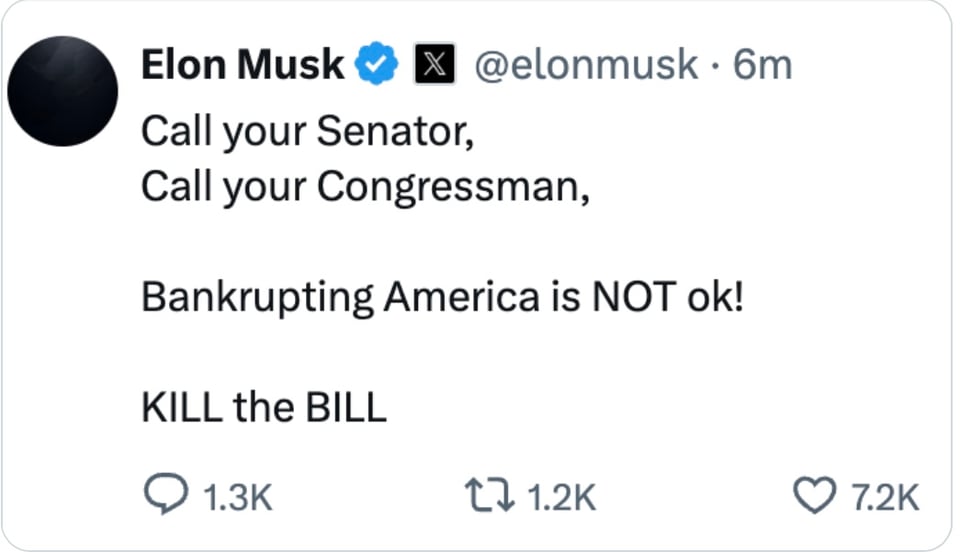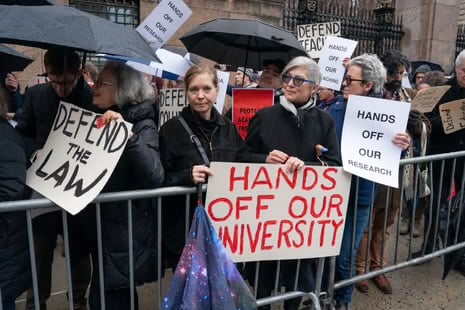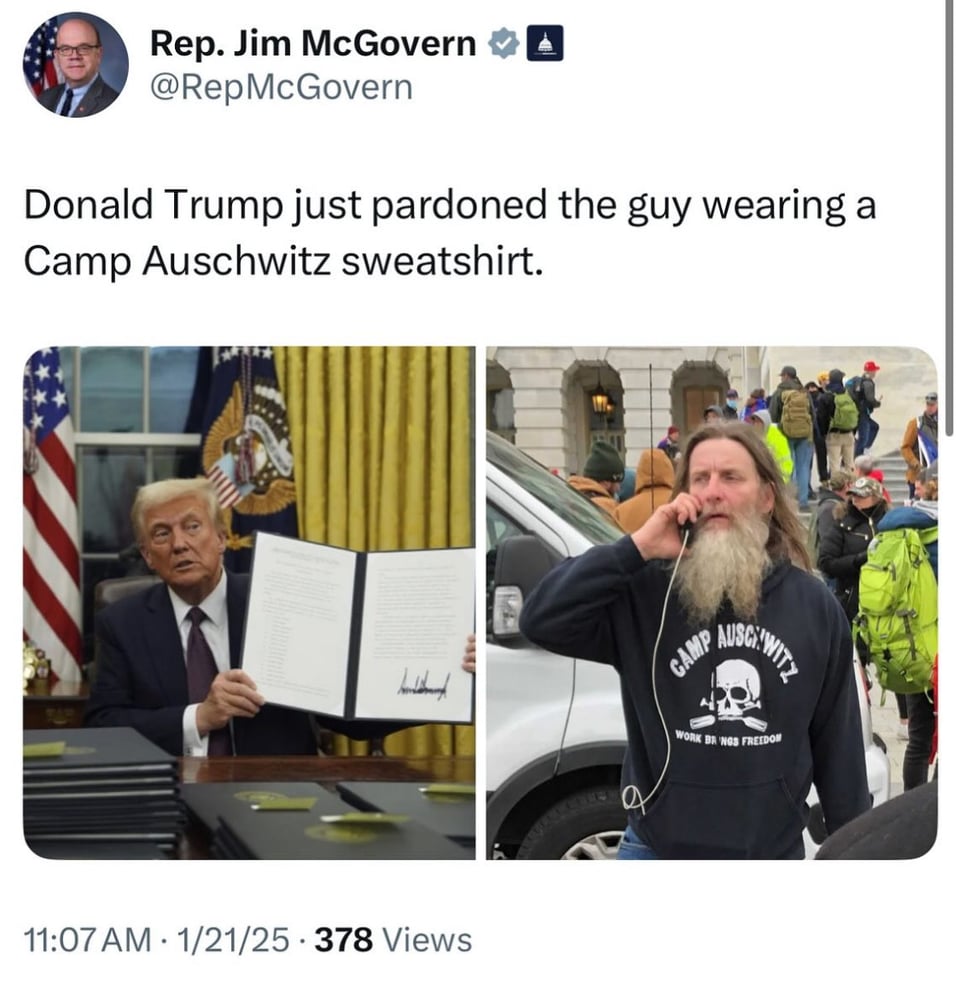Thursday, June 5, 2025. Annette’s Roundup for Democracy.
Analysis which makes clear why Trump’s bill now in the Senate is a “disgusting abomination.”
How many times have you called your Senators of either stripes this week? The U.S. Capitol Switchboard operator can connect you directly with the Senate office. (202) 224-3121.
President’s Policy Bill Would Add $2.4 Trillion to Debt, Analysis Shows.
The nonpartisan Congressional Budget Office said Wednesday that the broad Republican bill to cut taxes and slash some federal programs would add $2.4 trillion to the already soaring national debt over the next decade, in an analysis that was all but certain to inflame concerns that President Trump’s domestic agenda would lead to excessive government borrowing.
The C.B.O. analysis focused on the version of the bill that passed the House late last month, but the cost estimate could change as Republicans in the Senate begin to put their imprint on the legislation. G.O.P. lawmakers there want to deepen some of the bill’s tax cuts, while others are pressing to pare back some its cuts to Medicaid, the government health care program for the poor, and clean-energy tax incentives.
Conservatives and Wall Street investors had already expressed grave concerns that the measure would swell federal deficits, and some Senate Republicans have said they cannot back the legislation in its current form. That could derail the bill’s progress, given that the party can afford to lose no more than three votes in the Senate if all Democrats vote against it.
The legislation had long been expected to add significantly to the debt, given the enormous cost of extending the tax cuts that Republicans first put into place in 2017, the central pillar of the bill. Hard-right lawmakers demanded that the party use their total control of Washington to also slash spending and contain the cost of the legislation, but the C.B.O.’s estimate was a reminder that the party fell well short of covering the roughly $3.8 trillion cost of extending the tax cut.
In the House version of the bill, Republicans also turned to some well-worn gimmicks in a bid to lower the sticker price of the legislation. Several of the bill’s tax cut provisions, including Mr. Trump’s campaign pledges to not tax tips and overtime pay, would last for only a few years. Those cuts could become far more costly if they were continued.
In recent weeks, some analysts on Wall Street have started to voice their worry about the consequences of the legislation, given the nation’s already-precarious fiscal situation. Moody’s downgraded the credit rating of the United States last month, the last of the major rating firms to cast some doubt on the country’s ability to pay its bills.
To defend their legislation, some Republicans and White House aides have taken to attacking the C.B.O. as politically motivated and unreliable. But several nonpartisan independent groups that have analyzed the bill have also concluded that it would add significantly to the federal debt.
The Republican bill’s largest category of spending cuts is in health care, where reductions to Medicaid and the Affordable Care Act total roughly $1 trillion and will result in 10.3 million more Americans losing health insurance, according to new estimates from the Congressional Budget Office.
Last-minute changes to the bill, introduced just before it passed the House, increased the size of cuts to those programs. The biggest change, which moved up enactment of a work requirement for childless adult Medicaid beneficiaries, would save around $70 billion more than a previous version of the bill. A tweak to an Affordable Care Act funding formula would save $30 billion.(New York Times)
One more thing.
More Reasons to call.
BREAKING: The Congressional Budget Office projects 10.9 million more people will be uninsured in 2034 due to health care changes from Trump's big bill. https://t.co/6UdlU0sxZG
— The Associated Press (@AP) June 4, 2025
Electricity Prices Are Surging. The G.O.P. Megabill Could Push Them Higher.
The combination of a data center boom, rising gas exports and cuts to clean energy tax breaks could spike American energy bills, analysts say.
Trump is now fighting with Musk and with the Federalist Society’s Leonard Leo, who picked all his judicial appointees.
First, the fight with Musk continues.
Yesterday Musk on “X.”

Then, this.👇
Trump Is Losing Patience With Musk’s Outbursts Over Megabill
Billionaire’s attacks on Trump’s tax bill are fraying his relationship with the president.

WASHINGTON—President Trump is losing patience with Elon Musk after the billionaire attacked Republicans’ sprawling tax-and-spending bill. Musk is irked about Trump’s decision to withdraw the nomination of a key ally to lead the National Aeronautics and Space Administration.
The result is a fraying relationship between two of the world’s most powerful men.
A senior White House official said Trump wasn’t happy about Musk’s decision to lambaste his signature legislation, describing the president as confused as to why the Tesla chief executive decided to ratchet up his criticism after working so closely with the president for four months. The official said senior Trump advisers were caught off guard by Musk’s latest offensive.
The uneasy alliance between the two men was also strained by a recent move by the White House to nix Trump’s nominee to run NASA, Jared Isaacman, according to people familiar with the matter. Musk, a close ally of Isaacman, had advocated for him to get the job.
The decision infuriated Musk, who complained to associates over the weekend that he had donated hundreds of millions of dollars to help get Trump elected in last year’s campaign, only to see Isaacman’s nomination pulled, a person with direct knowledge of the matter said. Musk’s frustration over the NASA episode made him more willing to aggressively criticize the tax bill, people close to him said. Musk didn’t immediately respond to a request for comment.
In a series of social-media posts this week, the billionaire called the tax bill a “disgusting abomination,” and he threatened to try to oust GOP lawmakers for backing what he calls an “abhorrent” package of deficit-fueling spending.
On Wednesday afternoon, Musk launched another broadside against the legislation, demanding his over 200 million followers on X call senators and House lawmakers to “KILL the BILL.” Trump posted on Truth Social, without comment, an image of Musk’s departure message from last week.
Trump and Musk have often praised each other in public, with the president organizing a fawning send-off for the billionaire in the Oval Office last week as he wrapped up his work leading the Department of Government Efficiency. But the chumminess has masked flashes of skepticism and frustration from Trump and his aides in recent months, as Musk has criticized the president’s trade agenda and clashed with his advisers.
Asked whether Trump and Musk continue to have a strong relationship, a White House official said it is too soon to tell. The official said Trump is a forgiving person, but he doesn’t forget slights like this.
Even before the billionaire’s ramped-up attacks on the tax bill, some Trump allies worried that Musk would feel more free to criticize the administration after he left the White House. Some administration officials encouraged lawmakers on Capitol Hill to post positive social-media posts thanking Musk for his service out of hope such praise could avoid future confrontations, according to people familiar with the effort.
Musk has long harbored frustrations with the tax bill, raising concerns about provisions in the legislation that repeal tax credits for electric vehicles, people close to him said. Musk’s car company, Tesla, is one of the world’s largest manufacturers of electric vehicles. He is also the founder of SpaceX, which has government contracts with NASA. Isaacman has ties to SpaceX, including flying on the company’s first private flight to orbit.
White House officials privately dismissed Musk’s criticisms, arguing that he was focused on his business interests rather than the public interest.
After Trump withdrew the NASA nomination, Musk defended Isaacman in a post on X. “It is rare to find someone so competent and good-hearted,” Musk said. Isaacman has told associates he believes Musk’s departure gave the administration an opening to oust him, according to people familiar with the matter.
White House officials disputed that the move was aimed at removing a Musk ally from the administration, arguing it instead stemmed from Isaacman’s past donations to Democrats. Isaacman noted in a recent podcast interview that White House officials had been aware of the donations for months.
Musk’s moves have further complicated Republicans’ narrow path to passage of the megabill, which includes tax cuts and border spending, partially offset by trims to Medicaid, clean-energy tax credits and food aid.
Musk’s tweets re-energized the spending hawks in the Republican Party, but it wasn’t clear if it would shift the needle given Trump’s strong backing of the current package. The House passed the bill last month, and now the Senate is expected to make changes, which would then need to be approved again by the House before heading to Trump’s desk by a self-imposed July 4 deadline.
“This is Donald Trump’s signature achievement. This is important to him. Members had better think three or four times before they decide to get in the way of this victory,” said Rep. Dusty Johnson (R., S.D.), chair of the GOP Main Street Caucus.
The House bill has more than $1.2 trillion in spending cuts over a decade, and administration officials are hailing it as a historic step toward fiscal responsibility. But the bill would increase budget deficits by $2.4 trillion over the period, compared with doing nothing, according to a new Congressional Budget Office estimate released Wednesday.
Just six months ago, Musk’s barrage of social-media posts triggered a mutiny of Republicans to kill a government spending bill right before Christmas, forcing hasty rewrites by House Speaker Mike Johnson (R., La.). But that doesn’t appear to be happening in this case—at least not yet. Trump and GOP leaders have stuck with their plan, subject to some adjustments, while cognizant of the difficult math that means even a handful of Republican defectors in the House or Senate could sink the bill, given united Democratic opposition.
Johnson said Wednesday he was blindsided by Musk’s criticism. He said he spoke to Musk on Monday and walked him through the savings, policy prescriptions and tax revenue that Republicans argue the bill will bring in.
“We had a great, very friendly, very fruitful conversation together,” Johnson said at his weekly press conference. “Twenty-four hours later, he does a 180 and he comes out against the bill. And it surprised me, frankly.” Johnson said he called Musk on Tuesday night and hopes to talk to him on Wednesday, but Musk hasn’t yet returned his call.
Johnson argued Musk is “flat wrong” in this case, adding that Trump is “not delighted that Elon did a 180.” But Johnson says he himself is “not upset by this.”
Rep. Thomas Massie (R., Ky.), one of the two House Republicans who voted against the bill in the House last month, was pleased Musk was speaking out.
“I figured he would eventually get there,” said Massie, who noted the two haven’t spoken on the issue. “You don’t land rockets backwards or get cars to drive themselves by ignoring the people who are lying to you.” (Wall Street Journal)
Next, here is another critical ally Trump is fighting with.
Trump Attacked One of His Top Allies Out of the Blue. We Know Why.
Last week, President Donald Trump took many in the legal world by surprise when he attacked the chief architect of his first-term judicial nomination agenda, Leonard Leo, as a “sleazebag” who “probably hates America.” The tone was distinctly Trumpian, but the target was a bit of a shock. Back in 2016, Leo gave the new president-elect a slate of 21 Supreme Court candidates, all “Federalist people.” Selection of the 234 judges appointed in Trump’s first term was then “in-sourced” to the Federalist Society, according to former White House counsel Don McGahn.
Trump’s outburst marks a dramatic jolt to the relationship between Trump and the Federalist Society, as well as for the conservative bench at large. It is not likely a rupture, but rather a signal that the society must bend the knee—as all others seeking federal benevolence must do—to keep its prized place. Like the traditional Republican elites Trump has left in the dust, the society needs to find a place among the ornaments on the presidential mantel, or else be cast into the dust.
Founded in 1982, the Federalist Society has long exercised subtle, behind-the-scenes influence on Republican judicial picks. Its official line emphasizing “originalism” and “textualism” belies how predictably its picks track Republican views on regulation, presidential power, and religion. Such priorities reflect Leo’s enduring closeness to traditional Republican elites such as Sen. Mitch McConnell.
In 2016, it was Trump who benefited from the Federalist Society stamp of approval. A staggering 77 percent of Republican voters that year reported that Supreme Court appointments were “very important” to them. The Federalist Society’s process for credentialing nominees as clearly conservative helped Trump ostentatiously meet his campaign promise to appoint judges who would please these voters.
And the bench he built didn’t disappoint. Since 2020, a Supreme Court with three Trump appointees has advanced Republican priorities on affirmative action, abortion, and religious liberties. Perhaps even more significant have been its dramatic curbs on federal regulation in the form of “the major questions doctrine” and end to so-called Chevron deference, not to mention its stratospheric advancement of executive power in Trump v. U.S.
In 2025, the judicial and political terrain look different. Thanks in part to rulings like Trump v. U.S., the president is no longer the supplicant. Traditional Republican elites are now “terrified” of an Elon Musk–funded primary instigated by the president. He is no longer in thrall to policy and personnel choices. Sen. McConnell, for example, has voted against numerous Trump Cabinet nominations—not, to be sure, with any effect. Other stalwarts within the party have bucked against the president’s tariffs—again to no palpable result.
It is thus not simply that the president and Republican elites have split on policy: The brute force of Trump’s political power means that, for now at least, the president has the whip hand.
This same pivot is playing out in the president’s relation to the courts. For one thing, an administration that doesn’t know the meaning of basic constitutional rights such as habeas corpus—even as it violates that right—is unlikely to be one that places great weight on fidelity to originalist constitutional values. For another, a White House that treats mandatory federal spending as a cudgel against ideological foes will surely view judicial nominations in the same transactional way—just another perk with which to punish enemies or reward friends.
Today, courts rank among the hostile. Remember that the first Trump administration received bruising losses in cases concerning Deferred Action for Child Arrivals and a census question on citizenship. Even though Trump himself had appointed a full quarter of that bench by the end of his first term, the administration has faced a “stunning” tally of court losses in recent weeks.
Worse, decisions that once were Republican trophies wrought from an archconservative Supreme Court are now albatrosses weighing the Trump II project down. Take last month’s ruling invalidating the April 2 tariffs. This unanimous three-judge ruling—joined by one Trump appointee—hinged upon the “major questions doctrine” that is a cornerstone of the Roberts court’s deregulatory policy agenda. Trump is here being bitten by the beast he bred.
And unlike traditional Republican elites, Trump now is not pursuing a policy agenda in which the federal courts could be useful aides. The White House has shown that it believes itself capable of redefining citizenship, geography, and even biology by fiat. It hardly needs hand-holding by black-robed jurists. Like Congress, the hope is that the courts can also be relegated to mere accoutrement.
In attacking Leo, Trump is thus simply making plain this new alignment of power. Like other parts of the Republican establishment, he is saying, Leo and the Federalist Society have a role to play only if they are unswervingly loyal not to the Constitution, but to Trump’s own project.
Moreover, the president has made it clear what he demands from judges: As his post on Leo explained, he believes that the only reason a judge would rule against his policies is bad faith. So what he wants are men—like his recent U.S. Court of Appeals for the 3rd Circuit nominee Emil Bove—of dubious ethics but unswerving and uncaveated loyalty to the president.
It will now be up to the Federalist Society to decide whether they will bend the knee, following the example of other Republican elites, to say nothing of law firms and universities. While it might seem that fealty to “original public meaning” and to history would make this an insuperably difficult ask, it is a mistake to think that the legal conservative movement cannot adapt.
For now, Trump’s outburst won’t stop Leonard Leo, himself a rabid extremist, who will keep fighting to move America right.
This is his latest effort.👇
This Conservative is doing just fine, thank you, after getting dumped by Donald Trump.
Leonard Leo has more than $1 billion to back Hollywood blockbusters that shield viewers from diversity and other progressive ideas.

“House of David,” a retelling of the biblical shepherd’s unlikely rise, capped season one with the future king’s epic takedown of Goliath and started April in Amazon’s top streaming spot.
David’s surprise triumph was also Leonard Leo’s. The conservative lawyer and co-chairman of the Federalist Society has been secretly helping bankroll Wonder Project, a Texas-based studio that produced the popular series and, Leo hopes, will follow with a string of Christian- and conservative-leaning shows so slick they can go head-to-head with other big-budget entertainment.
Armed with a $1.6 billion gift from a Chicago industrialist, believed to be one of the largest single contribution to any politically active group in U.S. history, Leo wants to make America’s culture more conservative. That might sound as quixotic as killing a giant with a sling and a small stone.
But Leo, unbounded by the pressures of re-election or dependence on outside money, is a rare conservative, who, after being cast out of Trump’s inner circle, remains free to pursue his own vision of what will make America great again, leveraging the soft power of mass entertainment and the hard power of the courts.

NThe 59-year-old, who grew up in New Jersey, has already played a significant role pushing America’s judiciary to the right. Leo advised President Trump in his first term to nominate Federalist Society members Neil Gorsuch, Amy Coney Barrett and Brett Kavanaugh to the Supreme Court. All three now serve.
Leo has since fallen out of favor with the president, who believes Leo tried to take too much credit for the judicial picks, according to four advisers close to the president. Last week, angry over a string of judicial setbacks, Trump in a Truth Social post blamed the Federalist Society and called Leo a “sleazebag” who “probably hates America.”
In an interview last month, Leo praised Trump for some of his policy efforts but said the administration should follow the “rule of law” in its deportation actions, which in certain cases courts have said deprived migrants of their right to due process. Following Trump’s attack last week, Leo turned the other cheek. “There’s more work to be done, for sure, but the federal judiciary is better than it’s ever been in modern history,” he said.
After years of driving conservative causes in Washington, Leo is betting he can make an even bigger splash in Hollywood, winning over hearts and minds with wholesome tales of entrepreneurship, family unity and inspiring historical figures—young George Washington, for instance, and maybe the Wright brothers. His investments in private entertainment studios and startups take place out of the public eye.
“You can make investments in politics and public policy, but ultimately you’re going to be a lot more successful at that game if social and cultural institutions have the right sort of frame of reference, in terms of what life ought to be like in our country,” Leo said. That will take a new generation of conservative movie makers and like-minded production studios.
Leo is seeding the effort, alongside similarly aimed projects, with millions of dollars flowing through dozens of nonprofit groups and for-profit companies, according to tax and financial documents viewed by The Wall Street Journal and interviews with more than 20 people familiar with Leo’s investments and entertainment projects.
David Axelrod, a former top adviser to President Obama, called it “gilded guerrilla warfare.”
Teneo, one of the groups funded by Leo’s billion-dollar windfall, is a networking club of several hundred conservatives in politics and American corporations, recruited before they hit 40. “We believe that history is not shaped by isolated ‘great men’ or impersonal historical forces. Instead, we believe the heroes of history are well-positioned people working together toward the same goal,” according to a paper explaining its vision. (The group isn’t affiliated with the communications and advisory firm of the same name.)
Teneo has recently recruited roughly 100 members who work in movies, podcasts and entertainment financing, according to a person familiar with the matter. “Out of respect for the privacy of those engaged in the Teneo network, we don’t comment on what happens at events or who participates,” Teneo CEO Amanda Covo said. “But we’re excited about what appears to be many new successful ventures focused on high-quality family entertainment.”
Neither Leo, the companies nor the groups receiving money, including those outside of entertainment, would comment on the largely untraceable investments. Keeping political spending under wraps is a longtime Washington tactic. But Leo’s groups often take extra steps, such as donating money into larger funds that pool many other donations.
“He’s not a poor culture warrior anymore. He’s the generalissimo, and he’s got a big war chest and he doesn’t seem shy about directing it towards things that will benefit him,” said Robert Maguire, research director at the nonprofit Citizens for Responsibility and Ethics in Washington.
Good fortune
Leo joined the Federalist Society as a college student in the 1980s and spent three decades at the organization, which successfully challenged liberal dominance in the legal industry and judiciary. The group trained conservatives, fostered career networking and incubated legal views, once at the fringes, that have since been embraced by Supreme Court justices.
He advised the second Bush administration on judicial appointments and helped promote Supreme Court nominees as early as 2005, when he worked on a multimillion-dollar ad campaign promoting John Roberts, now the court’s chief justice.
He was a close ally of Trump for the first term, helping pick Supreme Court judges and filling the courts with record confirmations. The two haven’t spoken in five years. “Leonard Leo sat on the sidelines with all his money during the four years of lawfare against President Trump,” said Mike Davis, a Trump ally. “And now Leonard Leo is completely on the outs in the second term.”
But Leo received a life-altering fortune in 2020. Chicago billionaire Barre Seid donated all of his shares in Tripp Lite, his electrical products manufacturing company, to a nonprofit that Leo controlled. The company was sold for $1.6 billion the following year, affording more than a billion dollars to manage and disburse.
Leo said he had worked with the 93-year-old Seid over the years, but he declined to say in what fashion. Seid has for decades donated money to conservative groups, but he has never commented publicly on his politics. A representative for Seid didn’t respond to requests for comment.
Mirroring the Federalist Society’s successful strategy, Leo offers the prospect of professional networking and career advancement to attract conservative professionals. Teneo, one of the groups funded through Seid’s gift, has since its inception recruited C-suite executives on Wall Street and in Silicon Valley, one member said.
Teneo, founded in 2008, never raised more than a million dollars in a year until Leo took an interest in the group about five years ago. By 2023, it had grown into a $7 million-a-year organization. Under Leo’s guidance, Teneo has put resources into a subgroup focused exclusively on entertainment. It convenes its own conference each fall in Nashville, Tenn., which has become the hub for a new wave of conservative and Christian filmmakers, including two of its biggest luminaries, the brothers Andrew Erwin and Jon Erwin, both Teneo members.
Jon Erwin’s studio, Wonder Project, made the Amazon hit “House of David.”
Teneo conferences are relaxed gatherings where members build friendships and make professional connections. The entertainment group visits wineries and has heard talks, for instance, on how to build a podcast audience. Moviemakers get a chance to pitch projects to conservative funders.
Like the Wonder Project, some companies run by Teneo members get money from Leo’s network. Sycamore Studios is one. The children’s entertainment studio aims to draw a mass audience while keeping free of progressive views on diversity, gender or homosexuality.
“If parents trust a movie, they’re happy to put it on again and again,” Sycamore Studios co-founder Timothy Reckart wrote recently in the religion-focused magazine First Things. “This spares them the effort of making sure the movie is family-appropriate every time.”
The studio has hired the writers of two “Paw Patrol” movies to produce its first film, an animated adaptation of “Doctor Dolittle,” a character who can speak to animals and whose adventures echo the innocence of other children’s books published in the 1920s and 1930s.
A former Marvel Studios executive has signed on with Sycamore for an adaptation of the graphic novel ‘‘Zita the Spacegirl,” about a heroic girl on an intergalactic quest to rescue her best friend from an alien doomsday cult. Neither film will be explicitly Christian or conservative.
The Moving Picture Institute, an education-and-entertainment nonprofit with ties to Leo, has meanwhile produced a string of successful indie movies with libertarian themes. One is based on a true story about a journalist-turned-pinball player who battled to overturn a decadeslong ban in New York City. Its denouement features a pinball game played at city hall.
The film, which boasted an up-and-coming star in Mike Faist, won awards on the film festival circuit and streaming TV distribution—all markers of relative success for a small-budget indie movie. A New Yorker reviewer said it offered a “vibrantly scrappy re-creation” of 1970s New York and ranked it as one of his top 10 movies of 2023.
Another Moving Picture Institute film that toured the recent film-festival circuit was “Freedom Hair,” a story drawn from real life about a woman whose hair-braiding studio in Mississippi runs into trouble with the law over the state’s arduous occupational licensing laws—a libertarian-tinged tale about the evils of government overreach.
“If I catch you with this again, I’ll have to close you down and may arrest you,” an officer says to the woman in the movie while holding up a faulty business license.
“On what charge?” the woman retorts, “making a living?”
Leo’s network purposefully invests in studios rather than individual movies. Past films with a conservative point of view—“The Passion of the Christ” and “Thank You for Smoking”—grabbed attention but didn’t do much to change Hollywood. Leo and allies are betting that investing in people and movie studios will cement a conservative strain in entertainment culture for years.
While Leo’s goals are long-term, he hopes to spend his $1.6 billion expeditiously.
“We’re not going to be the Ford Foundation to be around forever,” he said. “The goal is to do our work, and at some point in time to decide that we’ve done what we can do and move on.”
Beyond the screen
While Leo is bullish on changing Hollywood, he also is investing millions to change corporate behavior.
For Leo and many Republicans, the wave of progressivism in the wake of the Covid-19 pandemic and the Black Lives Matter movement yielded troubling changes, such as companies rolling out diversity and environmental programs.
Turning away from a traditional laissez-faire approach, Leo and other conservatives set out to discourage such corporate endeavors. Groups like the State Financial Officers Foundation, also connected to Leo’s network, encourage state pension-fund operators to ditch asset managers that have embraced ESG initiatives.
Documents also indicate Leo’s network is tied to Vallecito Capital, a litigation-finance firm whose founder indicated it will fund lawsuits against companies that embraced diversity and sustainability initiatives.
Some of the groups receiving money from Leo employ CRC Advisors, a longtime Republican public-relations firm Leo joined in 2020. Leo “supercharged” the company, CEO Greg Mueller said.
Leo has allocated money to a range of nonprofits including Consumers’ Research, according to sources and tax documents. The nonprofit has run online ads—titled “Stop Corporate Creeps!”—that criticize executives who sit on boards of hospitals that perform sex-change operations.
“If you expose what corporate America is doing, what banks are doing, what financial institutions are doing, what investment advisers are doing,” Leo said, “that will create the kind of awareness where consumers and investors can respond with their buying. With their wallet.”
For now, consumers of popular entertainment are responding. More than 22 million people streamed Wonder Project’s “House of David” in the first 2½ weeks after its release.
Amazon has given the greenlight to a second season of “House of David,” which is now in production. After dispatching Goliath, according to the biblical account, David embarks on new adventures that lead him to becoming king of Israel and unite his people’s squabbling tribes.
It will likely take at least another season for Leo to see if he can do the same for his. (Wall Street Journal).
Trump thinks he has authority over everything.
Last Friday, Trump declared he was dismissing the head of the National Portrait Gallery, though he has no jurisdiction over that position.
Yesterday, Trump announced he was challenging Columbia’s accreditation. As hateful as his newest attack on Columbia is, Trump does not control the accreditation entities who evaluate our colleges.
Trump Escalates Attack on Columbia University by Threatening Its Accreditation.

The administration notified the university’s accrediting body that federal agencies had found that the school violated Jewish students’ civil rights.
The Trump administration escalated its attack on Columbia University on Wednesday by taking a warning shot against its accreditation, a key credential that U.S. universities need to receive federal student aid.
The federal Education Department’s Office for Civil Rights, which two weeks ago found that Columbia violated civil rights laws by “acting with deliberate indifference” toward the harassment of Jewish students, sent a letter on Wednesday to the Middle States Commission on Higher Education, the nongovernmental organization that accredits Columbia.
The letter said that because Columbia was in violation of federal anti-discrimination laws, the Education Department believes it fails to meet the standards for accreditation.
“University accreditors have an obligation to ensure member institutions abide by their standards,” Linda McMahon, the federal education secretary, said in a news release. She said the government looked forward to being “fully informed of actions taken to ensure Columbia’s compliance with accreditation standards, including compliance with federal civil rights laws.”
President Trump has described the accreditation process as his “secret weapon” to force ideological changes at universities. But the Trump administration does not have direct control over which universities are accredited. Instead, those decisions are made by nongovernmental organizations certified by the government, in a complex process meant to insulate universities from political interference.
Experts on the process said that despite the letter, Columbia faced no immediate threat that its accreditation would be revoked, a process that typically takes years.
“This is another semi-random attack against a celebrity institution,” said Ted Mitchell, the president of the American Council on Education, an association that includes many colleges and universities in its membership. “They are trying once again to skirt due process in order to score political points.”
Antoinette Flores, the director of higher education accountability and quality at New America, a Washington think tank, said she thought the letter was both a threat to Middle States, and to Columbia, about federal aid.
But she said that the Department of Education does not have the authority to determine what violates the accreditation group’s standards. Only the accrediting body can do that, which would require its own review of what is alleged.
Still, Ms. Flores said, the letter “is definitely an escalation. It is trying to weaponize the accreditor to get the institution to bend to its will.”
Middle States confirmed that it had received a letter on Wednesday but did not comment further.
Columbia said in a statement that it was “aware of the concerns raised” and said it had “addressed those concerns directly with Middle States.”
“Columbia is deeply committed to combating antisemitism on our campus,” the statement added. “We take this issue seriously and are continuing to work with the federal government to address it.”
Claire McCann, an expert on accreditation at the Postsecondary Education & Economics Research Center at American University, said that she would expect Middle States to examine the government’s findings that Columbia had violated civil rights law and make its own determination about next steps.
Part of that would involve considering whether Columbia was taking actions to remedy any violations of the law, which Columbia has said it is doing by tightening disciplinary procedures and rules on protests.
Middle States could come under pressure because it needs to be approved by the government to act as an accrediting body.
“They could send a warning letter to Columbia, or they could decide they don’t need to,” Ms. McCann said of what Middle States might do in the short-term. “It’s hard to say what the reaction might be.” (New York Times)

One more thing.
On Wednesday night, Trump issued another one of his proclamations.
Trump restricts international students from studying at Harvard.
President Trump barred most international students from entering the United States to study at Harvard University late Wednesday — escalating the Trump administration's battle with the Ivy League school.
In a proclamation, Mr. Trump suspended the entry of foreign students or exchange visitors planning to go to Harvard, unless his administration determines somebody's entry "would be in the national interest." The order also directs Secretary of State Marco Rubio to consider whether student visa holders who are already in the U.S. "should have their visas revoked."
The action comes after a judge stopped the Trump administration from taking away the school's ability to enroll foreign students.
CBS News has reached out to Harvard for comment.(CBS News)

Also, remember he did this.
While Trump claims he is the champion of the Jews, he did this, among his other antisemitic activities. Tell your friends.

Small but meaningful win.
MAJOR BREAKING
— MeidasTouch (@MeidasTouch) June 4, 2025
Democrat Keishan Scott WINS the special election for South Carolina's 50th State House District, defeating Republican William Oden by over 41 points in a district Kamala Harris won by about 5 in 2024.
🔵 Scott - 70.6%
🔴 Oden - 29.4%
🔵 Harris 51%
🔴 Trump 45.8% pic.twitter.com/K3Ju8kCyoQ